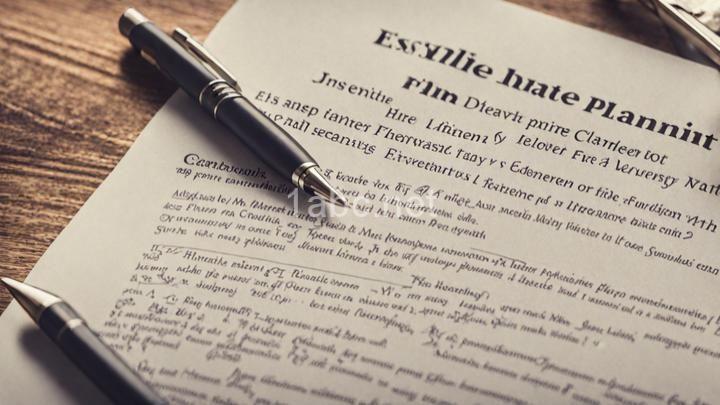Unlocking the Secrets: Discover the 10 Essential Steps in Estate Planning!
Section 1: Understanding Estate Planning
Section 2: Taking Inventory
Section 3: Setting Goals and Objectives
Section 4: Choosing Beneficiaries
Section 5: Designating Power of Attorney
Section 6: Creating a Will
Section 7: Considering Trusts
Section 8: Minimizing Taxes
Section 9: Reviewing Insurance Policies
Section 10: Regularly Reviewing and Updating Your Estate Plan
Conclusion:

Introduction:
Welcome to our blog, where we'll be unlocking the secrets of estate planning! Whether you're a young professional or a retiree, estate planning is a crucial step to ensure your assets are protected and your loved ones are taken care of after you're gone. In this blog post, we will guide you through the 10 essential steps in estate planning, providing you with the knowledge and tools you need to make informed decisions about your estate.
Section 1: Understanding Estate Planning
Before we dive into the essential steps, let's start by understanding what estate planning is all about. Estate planning is the process of organizing and managing your assets during your lifetime and beyond. Contrary to popular belief, estate planning is not just for the wealthy. It is for everyone who wants to have control over their assets and wishes, regardless of age or financial status. Estate planning allows you to make important decisions about the distribution of your assets, the care of your dependents, and even your own healthcare decisions.
Section 2: Taking Inventory
The first step in estate planning is taking inventory of all your assets. This includes both tangible items such as real estate, vehicles, and personal belongings, as well as intangible assets like bank accounts, investments, and intellectual property. To make this process easier, consider using spreadsheets or online tools to create a comprehensive inventory. Be sure to include any debts or liabilities as well. It's important to keep this inventory up to date by regularly reviewing and updating it as needed.
Section 3: Setting Goals and Objectives
Once you have a clear picture of your assets, it's time to set goals and objectives for your estate plan. Think about what you want to accomplish with your estate plan. Common goals include providing for loved ones, minimizing taxes, and supporting charitable causes. Take some time to consider any specific concerns or wishes you have regarding your assets or beneficiaries. Remember, your estate plan is a reflection of your values and priorities, so it's important to identify your goals and objectives early on.
Section 4: Choosing Beneficiaries
Choosing beneficiaries is a critical step in estate planning. Beneficiaries are individuals or organizations who will receive your assets upon your passing. When selecting beneficiaries, consider personal relationships and financial considerations. It's also important to regularly review and update your chosen beneficiaries as circumstances change. For example, you may need to remove a beneficiary who has passed away or add a new beneficiary such as a grandchild. Keeping your beneficiary designations up to date ensures that your assets are distributed according to your wishes.
Section 5: Designating Power of Attorney
Another important step in estate planning is designating power of attorney. This involves appointing someone you trust implicitly to make financial and healthcare decisions on your behalf if you become incapacitated. There are different types of power of attorney, including financial power of attorney and healthcare power of attorney. It's essential to choose someone who is not only trustworthy but also capable of handling these responsibilities. Discuss your wishes with your chosen power of attorney and ensure they understand your values and preferences.
Section 6: Creating a Will
A will is perhaps one of the most well-known components of estate planning. It is a legal document that outlines how your assets will be distributed after your death. In your will, you will name an executor, who will be responsible for ensuring your wishes are carried out. You may also include provisions for guardianship if you have minor children. It's important to seek legal advice when creating a will to ensure that it meets all necessary legal requirements and accurately reflects your intentions.
Section 7: Considering Trusts
While a will is a crucial part of estate planning, it may not be sufficient to meet all your goals and objectives. That's where trusts come into play. A trust is a legal arrangement that allows a third party, known as a trustee, to hold assets on behalf of beneficiaries. Trusts offer various benefits, such as avoiding probate, minimizing estate taxes, and controlling the distribution of assets over time. There are different types of trusts, including revocable trusts and irrevocable trusts, each with its own advantages and considerations. It's important to explore trust options based on your specific goals and circumstances.
Section 8: Minimizing Taxes
Estate taxes can have a significant impact on the distribution of your assets. Therefore, it's important to explore strategies for minimizing taxes as part of your estate plan. Gifting is one strategy that can help reduce your taxable estate. By gifting assets during your lifetime, you can transfer wealth to your beneficiaries while potentially minimizing estate taxes. Charitable contributions can also be an effective way to reduce your taxable estate while supporting causes you care about. Establishing a trust, such as a charitable remainder trust, can offer additional tax benefits. To ensure you're making the most informed decisions when it comes to taxes, it's advisable to consult with a tax professional who specializes in estate planning.
Section 9: Reviewing Insurance Policies
Life insurance plays a vital role in estate planning, as it can provide financial security for your loved ones after your passing. It's important to review your existing life insurance policies and assess whether you have adequate coverage. Life insurance can help replace lost income, pay off debts, and cover funeral expenses. As your circumstances change, such as starting a family or purchasing a new home, it's essential to reassess your insurance needs and make any necessary adjustments. Regularly reviewing your insurance policies ensures that your loved ones are protected in the event of your passing.
Section 10: Regularly Reviewing and Updating Your Estate Plan
Estate planning is not a one-time event. It's an ongoing process that requires regular review and updates. Major life events, such as marriage, divorce, or the birth of a child, can significantly impact your estate plan. It's important to review and update your estate plan accordingly to ensure it continues to align with your goals and objectives. As time goes on, your financial situation may change, tax laws may evolve, and your relationships may shift. By regularly reviewing and updating your estate plan, you can adapt to these changes and ensure your estate plan remains effective.
Conclusion:
Congratulations! You've unlocked the secrets of estate planning by discovering the 10 essential steps. We hope this blog post has provided you with a comprehensive overview of estate planning and empowered you to take action. Remember, estate planning is not something to be put off. It's a proactive step to protect your assets and ensure your wishes are honored. We encourage you to start the estate planning process sooner rather than later. Remember, you don't have to navigate this journey alone. Seek out legal professionals who specialize in estate planning to guide you through the process. Good luck on your estate planning journey!
FREQUENTLY ASKED QUESTIONS
What is estate planning?
Estate planning refers to the process of arranging how an individual's assets will be managed, preserved, and distributed after their death. It involves creating a plan to ensure that a person's wishes are carried out regarding the distribution of their property, care of dependents, and healthcare decisions. Estate planning typically involves the creation of legal documents such as wills, trusts, powers of attorney, and healthcare directives. The main goals of estate planning are to minimize taxes, avoid probate, protect assets, and provide for family members or other beneficiaries.
Why is estate planning important?
Estate planning is important for several reasons:
- Asset distribution: Estate planning allows you to specify how your assets will be distributed after your passing. Without a plan in place, the legal system will determine how your assets are distributed, which may not align with your wishes.
- Family protection: Estate planning allows you to provide financially for your loved ones and ensure their well-being in the event of your death. You can appoint guardians for minor children and set up trusts to protect assets until they are old enough to manage them.
- Minimize taxes and expenses: Proper estate planning can help minimize estate taxes and other expenses that may arise upon your death. It allows you to take advantage of tax-reduction strategies and ensure that your loved ones don't face unnecessary financial burdens.
- Healthcare decisions: Estate planning includes documents like a healthcare power of attorney and living will, which outline your medical treatment preferences and appoint someone you trust to make healthcare decisions on your behalf if you become unable to do so.
- Business succession: If you own a business, estate planning can help ensure a smooth transition of ownership and management. It allows you to specify who will take over your business and how it will be managed after your retirement, disability, or death.
Overall, estate planning provides peace of mind, protects your loved ones, and ensures that your assets are distributed according to your wishes. It's a proactive approach to managing your financial matters and preparing for the future.
Who needs estate planning?
Estate planning is important for everyone, regardless of age or wealth. Here are some groups of people who typically need estate planning:
- Individuals with assets: If you own any assets, such as property, investments, or personal belongings, estate planning can ensure they are distributed according to your wishes after your passing.
- Parents with minor children: Estate planning allows parents to designate guardians for their children in case both parents pass away. It also ensures that the children's financial needs are taken care of through trusts or other provisions.
- Individuals with specific healthcare wishes: Advance healthcare directives and medical powers of attorney are essential parts of estate planning. They allow you to outline your healthcare preferences and designate a trusted person to make medical decisions on your behalf if you're unable to do so.
- Individuals concerned about incapacity: Estate planning includes documents like living wills and durable powers of attorney, which provide instructions and appoint someone to manage your affairs in case you become incapacitated.
- Business owners: For business owners, estate planning encompasses plans for the continuation or succession of the business after their death. It helps ensure a smooth transition and mitigates potential disputes.
- High-net-worth individuals: Estate planning is particularly crucial for individuals with significant assets. It helps minimize estate taxes, protect wealth, and control the distribution of assets to beneficiaries.
Remember, estate planning is not just for the wealthy; it's for anyone who wants to have a say in how their affairs are managed and their assets distributed when they are no longer able to do so.
What are the benefits of estate planning?
Estate planning offers several benefits including:
- Asset Distribution: It allows you to determine how your assets will be distributed after your passing. This ensures that your estate is transferred to the right beneficiaries according to your wishes.
- Wealth Preservation: Proper estate planning can help minimize estate taxes and avoid unnecessary expenses, allowing you to preserve more of your wealth and pass it on to your chosen beneficiaries.
- Protecting Your Family: Estate planning enables you to protect your loved ones by providing for their financial well-being, especially in the event of your disability or death. It ensures that your family members are taken care of and their needs are met.
- Minimizing Family Conflicts: Clear estate planning documentation can help reduce family disputes and legal battles over inheritance. It provides a roadmap for the equitable distribution of your assets, thus minimizing conflicts among family members.
- Business Continuity: If you own a business, estate planning ensures a smooth transition and continuity of operations in the event of your incapacity or death. It allows for a clear succession plan to be put in place, preserving the business and its value.
- Incapacity Planning: Estate planning also involves establishing documents such as durable power of attorney and healthcare directives, which designate someone to make financial and medical decisions on your behalf if you become incapacitated.
- Privacy and Confidentiality: Through various estate planning strategies, you can maintain privacy and confidentiality for your assets and beneficiaries. This can be particularly beneficial if you wish to keep financial matters private.
- Peace of Mind: Having comprehensive estate planning in place can provide you with peace of mind, knowing that your wishes will be carried out, your loved ones will be taken care of, and your legacy will be protected.
It's important to consult with a qualified estate planning attorney or financial advisor to determine the best plan for your specific needs and goals.




